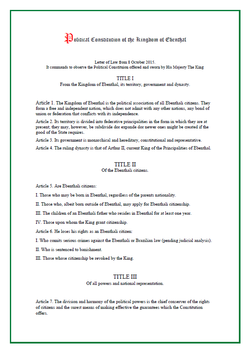Ebenthaler Constitution of 2015
| Constitution of the Kingdom of Ebenthal | |
 First page of the Ebenthali magna carta
| |
| Created | 8 October 2015 |
| Ratified | 8 October 2015 |
| Authors | Constituent Assembly |
| Signers | Arthur Beato Henrique Heinrich Éric de Pádua Pedro Reis |
The Ebenthaler Constitution of 2015, officially called Political Constitution of the Kingdom of Ebenthal (Portuguese: Constituição Política do Reino de Ebenthal) was Ebenthal's first constitution, in power from 8 October 2015 to 5 February 2024, when it was revoked and replaced by the Ebenthaler Constitution of 2024.
The 2015 constitution began writing in August 2014, shortly after Ebenthal's independence. Its initial draft was largely inspired by the July 2014 Roschfallenian constitution, and between Ebenthaler independence and the promulgation of the constitution, Ebenthal operated under that initial draft. The constitution was finally promulgated in 2015, greatly influenced by the Brazilian constitution of 1824 and the Portuguese constitution of 1826. However, between its promulgation and its repeal, the constitution underwent seven amendments, among which the most significant abolished the exclusivity of aristocratic franchise, paving the way for the establishment of a democracy, and instituted a bicameral parliament, replacing the original unicameral parliament.[1]
History
The Constitution of Ebenthal had its formulation started as soon as the country became independent in August 2014. Discussions led to the decision to establish a constitution similar to the Roschfallenian constitutional project which got rejected in June 2014. That project on itself was heavily inspired by the constitution of the Empire of Brazil with features resembling the 1826 Portuguese Constitution and also invoking a few parts of the constitution of the Ottoman Empire. Over the course of the following months, the discussion centered mainly around the role of the monarch.
As the project wasn't rapidly approved, a King's decree ordered the country to follow any constitutional project, even unaccepted, as if it was in force, in order to keep things as ordered as possible. The discussion on the project eventually stalled as the Ebenthali Independence War reached its peak and holidays arrived. Once the works returned, it was clear that the monarch should exercise political powers in order to keep the micronation stable as King Arthur I did during the war. The discussion then moved to the religious status of the state, as the King wanted it to be a Catholic confessionary state. Nonetheless, this was prevented by the First Lord Éric de Pádua who convincend the members of the Constituent that a secular state was imperative since the micronation's citizens by then were already of many different religions and there would be no actual religious festivities executed by the state.
The last issue discussed was the creation of an armed force. Most members of the constituent felt it would be "cool" to have an armed force, even if solely on paper, for ceremonial purposes. Solved this, the final draft was formally introduced to the Conclave on 8 October 2015, after more than a year being developed. In a special session the draft was unanimously approved and entered in force.
References
- ↑ Ministry of Information. New legislature, new government. Published on 28 March 2021. Retrieved on 14 June 2021.